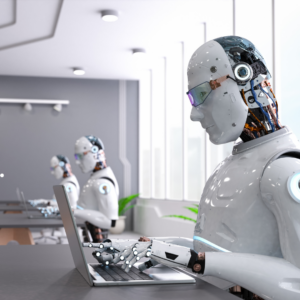
It seems there’s no end to the mass of information being written about artificial intelligence (AI) in the workplace. Articles abound on the benefits of AI and how it could further improve today’s ultramodern systems, including better accuracy and safety along with more transparency. On the other hand, AI is also invoking big concerns among technology advocates, including some like Elon Musk who have signed an open letter calling for a 6-month pause in the development of advanced AI.
Although proponents tout the benefits of the technology, AI is predicted to decimate jobs across multiple industries. Between 2020 and 2025, automation will be responsible for the loss of 85 million jobs as more tasks are turned over to robots. Yet despite this, many executives believe artificial intelligence will be adopted within the workplace over the next one to two years, according to an article in CFO Dive.
Companies such as IBM are already taking the plunge, pausing hiring for jobs that could be done by AI. A Bloomberg article reported roughly 7,800 jobs could be replaced at the company. Others are waiting for the use of the technology to further prove itself despite some adoption of the Microsoft-backed OpenAI ChatGPT.
A survey from KPMG found a majority of U.S. corporate executives aren’t prepared for the adoption of generative AI tech that can produce text and other forms of learned output, and only 6% of organizations have a dedicated AI team currently in place. Yet, 65% of those surveyed believe generative AI will still have a major impact on their organization over the next three to five years. Adoption within the workplace will also include hurdles to figuring out clear business cases and figuring out the right talent, governance, and installation for the technology.
Other elements yet to be considered include the development of national and international regulations and organizational standards for the application. Additionally, AI is yet to be a part of many company cultures, leaving ample room for discussion particularly around the humanities perspectives of the application.
This is finding organizations in a wait-and-see position as they look for ways to “prove” the best use of the technology. Pausing might not be a bad idea as more start to question how to best use AI, particularly as it cannot decide ethics or morality. Others are questioning if its use in the job recruitment process could lead to ushering in discriminatory hiring practices. These elements raise a few questions, particularly as AI is capable of so much and its rate of improvement is exponential and uncontrollable.

